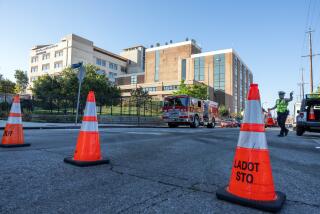Report Finds King/Drew Still Has Ills
- Share via
The lapses continue at Martin Luther King Jr./Drew Medical Center: blatant medication errors, excessive delays in care, neglect of at least one patient who ultimately died.
According to a confidential hospital document reviewed by The Times, King/Drew still suffers from many of the same patient-care problems that have been cited, repeatedly, by accreditors and regulators over the last two years.
The recent failings identified in the report help explain the opinion issued earlier this week by county health director Dr. Thomas Garthwaite that King/Drew might well fail an upcoming federal inspection key to its survival.
In one case, according to the report, a nurse alerted a physician trainee to a patient with reduced oxygen levels. The doctor failed to examine the patient and, after being summoned again, determined only that the patient was sleeping. An hour later, the patient went into distress and died.
In another case, a patient with a possible spinal cord injury had to wait four days for a magnetic resonance imaging scan needed for diagnosis and treatment, the document said.
Separately, a resident intentionally administered blood ordered for one patient to another, the document said -- a violation of blood bank rules.
The state Department of Health Services, which was notified of the incidents Wednesday, said it would investigate.
Agency spokeswoman Lea Brooks said inspectors also would look into a report that an El Monte police officer this week used a Taser gun against a psychiatric patient at King/Drew. Tasering by county police has been an ongoing concern at the hospital.
Most of the errors and neglect cited in the confidential report occurred in the last two months, under the watch of Navigant Consulting Inc., a firm hired last fall to reform the hospital’s operations.
The company’s contract expires Oct. 31, but the county is seeking a six-month extension.
The document was prepared by Navigant and King/Drew staff to impress upon medical department chairmen and hospital advisors “the importance of vigilance, and to point out areas where we think they can improve their monitoring and oversight,” Garthwaite said.
Speaking of the hospital staff, he said, “it would be fair to say that some individuals do not have enough of a sense of urgency.”
Garthwaite would not discuss the specific cases this week with The Times, citing patient privacy and quality assurance rules.
In a sense, he said, King/Drew was under scrutiny now because of its own vigilance. In contrast to past lapses, he said, the problems were discovered internally, investigated appropriately and acted upon to prevent recurrences.
“All but one of the examples represented identification of potential problems that had no impact on the clinical outcome” for the patients, Garthwaite wrote in a memo late Wednesday to the county Board of Supervisors.
Such mistakes can happen at even the nation’s best hospitals, Garthwaite said, adding that no institution has received the same level of media and regulatory scrutiny as King/Drew.
King/Drew, which serves a predominantly poor and minority community in Willowbrook, just south of Watts, lost its national accreditation in February and has been threatened with a loss of $200 million in federal funds, more than half its budget.
Some of the problems recur despite concerted efforts to fix them.
In January, for instance, Dr. Roger Peeks, the hospital’s medical director, sent out a memo saying “inadequately trained and not properly supervised” first-year residents inadvertently left guide wires in three patients.
The confidential document suggests that two wires may have been left in patients since then.
Federal regulators faulted the hospital in March 2004 for inappropriately giving a potent anti-cancer drug to a meningitis patient for four days.
Numerous other instances have been cited in which patients had been given the wrong drug -- or the correct drugs in the wrong dosages.
The recent report found that since August, doctors have ordered potentially harmful antibiotics for six patients with known penicillin allergies and prescribed incorrect doses of other drugs, which could have been fatal. Garthwaite said, however, that the pharmacy staff caught the errors before patients were given the drugs, so no patients were harmed.
Medical experts offered a mixed assessment of King/Drew’s progress.
Dr. Kenneth Kizer, a national patient safety expert who serves on King/Drew’s advisory board, said fixing the hospital is “turning out to be probably harder than anyone expected.”
“None of these things should happen,” said Kizer, who is chairman of the board’s quality subcommittee. “The fact that they’re continuing to happen is discouraging and disappointing when the hospital has been on notice.”
Kizer said he did, however, see signs of improvement, including new systems being put in place to prevent errors.
Dr. Robert Wachter, chief of the medical service at UC San Francisco Medical Center, said regulators should base their decisions about King/Drew’s fate on more than just anecdotes.
Inspectors are “not blind to the number and severity of errors,” Wachter said, “but I think they recognize that even really terrific hospitals have errors. And the issue is: What are they doing to catch them before they cause real harm?”
More to Read
Sign up for Essential California
The most important California stories and recommendations in your inbox every morning.
You may occasionally receive promotional content from the Los Angeles Times.













